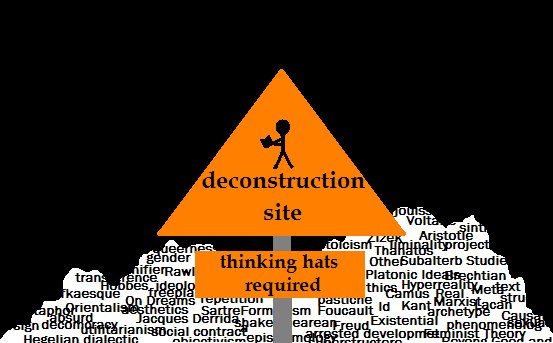Actually, the Derridian concept of hauntology might make interesting, even if strange, bedfellows out of yesterday’s episode and today’s blog. You see, instead of using his 40 minutes with
Showing posts with label Francis Fukuyama. Show all posts
Showing posts with label Francis Fukuyama. Show all posts
Sunday, May 18, 2008
Deconstructing Phil. is Back From the Dead
First, there are a few administrative details to consider: Today’s post has no citations since I originally developed it as an outline for a video weblog. The quotes, of course, are still good. I’d also like to provide a quick apologia for the fact that it’s been over 2 months since the last post and, in fact, there have only been 7 entries since January. Mostly, this is the result of a short hospital stay, a few Existential crisises, and the gloomy exigencies of finishing the first year of law school. Instead of using my powers of critical theory against Dr. Phil, I’ve felt compelled to channel my theoretical might at the institution of law school so as to counteract the acknowledged goal of brainwashing students into forgetting everything they’ve ever learned or thought. And I think I’ve been moderately successful. Constitutional law taught me that our nation’s most hallowed document was written by a homogeneous bunch of dilettantes who, in many fundamental ways, misread Rousseau, Locke, and Hume while only selectively admiring aspects of the ancient Roman Republic and Greek city-states. Criminal law suggests that society punishes it’s own members not out of utilitarian benevolence or retributivist motivation, but simply because without incarcerating and institutionalizing certain individuals, no one would ever feel free. In Contracts and Property, I learned that the current legal system—immensely complex and steeped in antiquated traditions—exists primarily to turn simple acts—like buying and selling goods, or living on a tiny piece of land—into situations of meta-exploitation where everything and everyone—even the greatest titans of business—is controlled, represented, and manipulated by a select class (lawyers) with the singular objective of preserving that one exceedingly important legal concept: stare decisis, precedent, tradition, the status quo. This doesn’t relate to the Dr. Phil show, but what of value ever could?
Actually, the Derridian concept of hauntology might make interesting, even if strange, bedfellows out of yesterday’s episode and today’s blog. You see, instead of using his 40 minutes withAmerica Hollywood Europe
Actually, the Derridian concept of hauntology might make interesting, even if strange, bedfellows out of yesterday’s episode and today’s blog. You see, instead of using his 40 minutes with
Subscribe to:
Posts (Atom)

